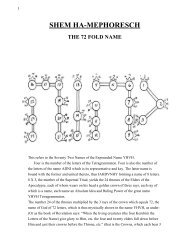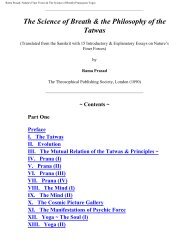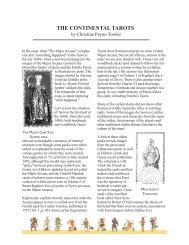Band 2 Anthropogenesis - H.P. Blavatsky
Band 2 Anthropogenesis - H.P. Blavatsky
Band 2 Anthropogenesis - H.P. Blavatsky
You also want an ePaper? Increase the reach of your titles
YUMPU automatically turns print PDFs into web optimized ePapers that Google loves.
questions which the curiosity of the Aryans offered in the early days of their existence, and which found their answer in<br />
the myth of Prometheus"; (Mythologie de la Grece Antique, p. 258).<br />
The philosophy of Occult Science finds two weak points in the above reflections, and points them out. The miserable<br />
state of Humanity described by AEschylus and Prometheus was no more wretched then, in the early days of the Aryans,<br />
than it is now. That "state" was limited to the savage tribes; and the now-existing savages are not a whit more happy or<br />
unhappy than their forefathers were a million years ago.<br />
It is an accepted fact in Science that "rude implements, exactly resembling those in use among existing savages," are<br />
found in river-gravels and caves geologically "implying an enormous antiquity." So great is that resemblance that, as the<br />
author of "The Modern Zoroastrian" tells us: "If the collection in the Colonial Exhibition of stone celts and arrow-heads<br />
used now by the Bushmen of South Africa were placed side by side with one from the British Museum of similar objects<br />
from Kent's Cavern or the Caves of Dordogne, no one but an expert could distinguish between them" (p. 145). And if<br />
there are Bushmen existing now, in our age of the highest civilization, who are no higher intellectually than the race of<br />
men which inhabited Devonshire and Southern France during the Palaeolithic age, why could not the latter have lived<br />
simultaneously with, and have been the contemporary of, other races as highly civilized for their day as we are for ours?<br />
That the sum of knowledge increases daily in mankind, "but that intellectual capacity does not increase with it," is shown<br />
when the intellect, if not the physical knowledge, of the Euclids, Pythagorases, Paninis, Kapilas, Platos, and Socrates, is<br />
compared with that of the Newtons, Kants, and the modern Huxleys and Haeckels. On comparing the results obtained by<br />
Dr. J. Barnard Davis, the Craniologist, worked out in 1868 (Trans. of the Royal Society of London), with regard to the<br />
internal capacity of the skull -- its volume being taken as the standard and test for judging of the intellectual capacities --<br />
Dr. Pfaff finds that this capacity among the French (certainly in the highest rank of mankind) is 88.4 cubic inches, being<br />
thus "perceptibly smaller than that of the Polynesians generally, which, even among many Papuans and Alfuras of the<br />
lowest grade, amounts to 89 and 89.7 cubic inches"; which shows that it is the quality and not the quantity of the brain<br />
that is the cause of intellectual capacity. The<br />
------------------------------------------------------------------------<br />
[[Vol. 2, Page]] 523 THE BOON GIVEN BY PROMETHEUS.<br />
average index of skulls among various races having been now recognized to be "one of the most characteristic marks of<br />
difference between different races," the following comparison is suggestive: "The index of breadth among the<br />
Scandinavians (is) at 75: among the English at 76; among Holsteiners at 77; in Bresgau at 80; Schiller's skull shows an<br />
index of breadth even of 82 . . . the Madurese also 82!" Finally, the same comparison between the oldest skulls known<br />
and the European, brings to light the startling fact "that most of these old skulls, belonging to the stone period, are above<br />
rather than below the average of the brain of the now living man in volume." Calculating the measures for the height,<br />
breadth, and length in inches from the average measurements of several skulls, the following sums are obtained:--<br />
1. Old Northern skulls of the stone age . . . . . . . . . . . . 18.877 ins.<br />
2. Average of 48 skulls of the same period from England . . . . 18.858 "<br />
3. Average of 7 skulls of the same period from Wales . . . . . 18.649 "<br />
4. Average of 36 skulls of the stone age from France . . . . . 18.220 "<br />
The average of the now living Europeans is 18.579 inches; of Hottentots, 17.795 inches!<br />
Which figures show plainly "that the size of the brain of the oldest populations known to us is not such as to place them<br />
on a lower level than that of the now living inhabitants of the Earth" ("The Age and Origin of Man"). Besides which, they<br />
show the "missing link" vanishing into thin air. Of these, however, more anon: we must return to our direct subject.<br />
The race which Jupiter so ardently desired "to quench, and plant a new one in its stead" (AEsch.* 241), suffered mental,<br />
not physical misery. The first boon Prometheus gave to mortals, as he tells the "Chorus," was to hinder them "from<br />
foreseeing death" (256); he "saved the mortal race from sinking blasted down to Hades' gloom" (244); and then only,<br />
"besides" that, he gave them fire (260). This shows plainly the dual character, at any rate of the Promethean myth, if<br />
Orientalists will not accept the existence of the seven keys taught in Occultism. This relates to the first opening of man's<br />
spiritual perceptions, not to his first seeing or discovering fire. For fire was never "discovered," but existed on earth since<br />
its beginning. It existed in the seismic activity of the early ages, volcanic eruptions being as frequent and constant in<br />
those periods as fog is in England now. And if we are told that men appeared so late on Earth that nearly all the<br />
volcanoes, with the exception of a few, were already extinct, and that geological disturbances had made room for a more<br />
settled state of things, we answer: Let a new race of men -- whether evolved from angel or gorilla -- appear now on any<br />
uninhabited<br />
[[Footnote(s)]] -------------------------------------------------<br />
* Prometheus Vinctus.<br />
------------------------------------------------------------------------<br />
[[Vol. 2, Page]] 524 THE SECRET DOCTRINE.<br />
spot of the globe, with the exception perhaps of the Sahara, and a thousand to one it would not be a year or two old<br />
before discovering fire, through the fall of lightning setting in flames grass or something else. This assumption, that<br />
primitive man lived ages on earth before he was made acquainted with fire, is one of the most painfully illogical of all. But<br />
old AEschylus was an initiate, and knew well what he was giving out.*<br />
No occultist acquainted with symbology and the fact that Wisdom came to us from the East, will deny for a moment that<br />
the myth of Prometheus has reached Europe from Aryavarta. Nor is he likely to deny that in one sense Prometheus<br />
represents fire by friction. Therefore, he admires the sagacity of M. F. Baudry, who shows in his Les Mythes du feu et<br />
breuvage celeste (Revue germanique, 1861 p. 356)** one of the aspects of Prometheus and his origin from India. He<br />
shows the reader the supposed primitive process to obtain fire, still in use to-day in India to light the sacrificial flame. This<br />
is what he says:--
















